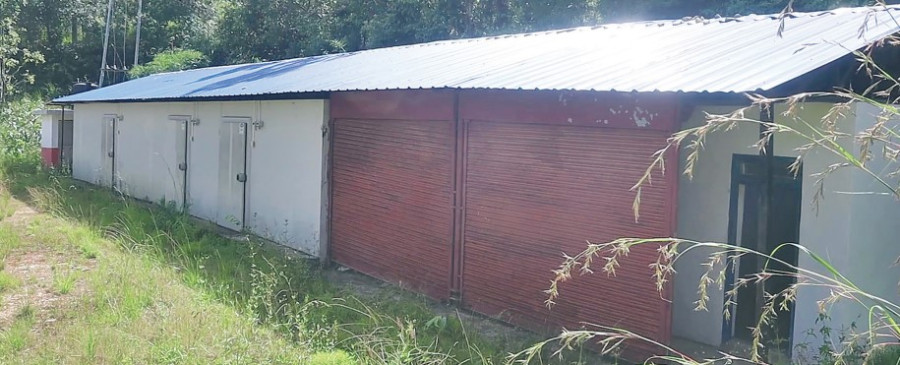Money
How a provincial government squandered tax money
More than Rs330 million in taxpayer money allocated for the construction of cold storage facilities in Lumbini Province has gone to waste.
Ghanshyam Gautam
Upwards of Rs330 million in taxpayer money allocated for the construction of cold storage facilities in Lumbini province under the smart agriculture programme has been squandered in the last three years.
Insiders say the facilities were constructed without doing any viability or feasibility studies on the commercial aspects and resulted in the waste of taxpayer money.
Most of the cold stores built by the provincial government have not been used, while some of the plants are on the verge of closure as they failed to make income.
In 2019-20, the Lumbini province introduced Smart Krishi [smart agriculture] programme, particularly targeting the youth in agriculture.
The provincial government has allocated a budget of Rs330.33 million to construct 23 cold storage facilities with capacities ranging from 300 to 850 tonnes in several districts.
According to the Ministry of Agriculture and Land Management of the Lumbini province, construction of four cold stores was completed in the fiscal year 2019-20, three in 2020-21, nine in 2021-22 and three in 2022-23.
Five such facilities are yet to be constructed.
Insiders say that many such facilities have not been able to operate due to the lack of funds, while some facilities do not meet the standards.
They said that in some areas there are no agricultural products to store.
For instance, a cold storage plant built with an investment of Rs50.55 million at Dahaban in ward 2 of Triveni Rural Municipality in Rolpa in 2020 has yet to come into operation.
The provincial government supported Rs30.61 million for the construction of the cold store. And the local government will chip in 25 percent of the project cost.
As per the agreement, the Nuwagaun Sana Kishan Krishi Cooperatives would operate the cold facility. The cooperatives operated the facility two years ago storing potato, onion, tomato and lemon.
The cold storage facility, however, became a headache for the cooperative after it’s electricity bill in six months totalled Rs500,000.
“Unable to pay the bill, the facility was shut down,” said Chandra Bahadur Basnet, secretary of Nuwagaun Sana Kishan Krishi Cooperatives.
“We have to manage Rs85,000 to pay the electricity bill monthly which was less than the cold store’s income.”
Also, the provincial Agriculture Ministry did not release Rs6.6 million which it had earlied pledged to provide to the project.
The local government too did not release the funds.
“There was no situation to operate the cold store,” Basnet added.
In ward 3 of Kapilvastu Municipality in Kapilvastu district, a farmers’ group built a 50-tonne cold storage facility at an investment of Rs10.46 million. Fifty percent of its investment was borne by the provincial government and the rest by the farmers’ group.
However, the project did not meet the requisite standard. The facility has been closed for the last three years.
Ratnakar Sukla, coordinator of the farmers’ group, said there was nothing to store, so it was eventually shut down.
It was a big cold storage facility aimed at resolving the problem of farmers.
However, the group was unable to manage the monthly operating expenses.
“We didn’t have any alternative to shutting it down,” said Sukla.
“The farmers did not bring their products to the cold stores. The members involved in the group, however, have no agricultural products,” said Sukla.
The monthly electricity bill would be more than Rs60,000 to operate the facility at full capacity, he said. “The income was not enough to operate the facility. So, it has to be shut down.”
Sukla said that the cold stores built in bordering India have been supplying electricity at Rs1 per unit. In Nepal, it costs Rs5 per unit. “The low electricity cost to run the cold stores in India makes Nepali agricultural products less competitive,” he said.
The Pragatisil Tarkari Krishak Samuha in Dhurkot Rural Municipality of Gulmi constructed a 100-tonne cold storage facility at an investment of Rs10.45 million. It has been shut down for the past eight months.
Farmers say that they suffered a loss when their oranges stored in the facility decayed within two months.
Bhupal Pokharel, chairman of Dhurkot Rural Municipality, said lack of technical human resources who manage the cold stores' temperature and short out the technical problems, the facility has become useless, said Pokharel.
“Nearly 90 tonnes of oranges were decayed within two months. We informed the technical problem to the provincial Agriculture Ministry and the Agriculture Knowledge Center of the district, but they didn’t respond to us,” said Pokharel.
Kamal Raj Shrestha, a former lawmaker in Lumbini province and the coordinator of the Agriculture Grant Inspection Committee, said that at least a feasibility study needs to be conducted while investing in the project.
He said as the government did not conduct a feasibility study and invested millions in such projects, the result is a zero.
“There is a need to do a feasibility study, the production of the areas, its market and profit, said Shrestha.
Shiva Shakti Misrit Krisak Samuha of Padini Rural Municipality-1 Arghakhachi constructed a cold store with a capacity to store 500 tonnes of goods.
The total investment amounted to Rs20.50 million. The provincial government supported Rs10.43 million for the project.
However, the project was not able to manage the technical aspect, resulting in the decay of 20 tonnes of oranges worth Rs5 million. “Famers suffered a loss, said Chiranjivi Poudel, a member of the farmers’ group.




 14.12°C Kathmandu
14.12°C Kathmandu














